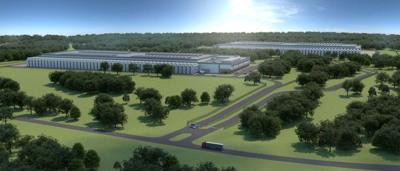Hut 8 has broken ground on its $2.5 billion artificial intelligence data center in West Feliciana Parish.
Miami-based Hut 8 is working with Entergy to prepare the substation and switchyard at its River Bend site, a 611-acre parcel off La. 964. Parish officials approved the project in January, which backers said will create thousands of construction jobs and more than 50 technician and maintenance jobs.
The first phase of construction will produce two 450,000-square-foot buildings, the first to be completed by the end of the year, the second to be completed before the end of 2026. An undisclosed tenant will equip the center with $10 billion worth of computers and other materials, Riley Trettel, the senior vice president of data center development, said in January.
Kenny Havard, the president of West Feliciana Parish, said the data center will generate tax revenue that he hopes will enable the parish to lower taxes and raise pay for public servants in the future. His goal is to raise the parish's quality of life, while adding walking paths and green spaces.
"It's going to be life-changing for the whole community," Havard said.
The parish can levy property taxes from the center, but cannot collect taxes on the center's computers and electronic equipment due to a 2024 law exempting data centers from equipment sales taxes.
Hut 8 operates Bitcoin mining facilities and data centers at 15 sites across the U.S. and Canada. The company is named after the building where pioneering computer scientist Alan Turing created the machines that cracked the Enigma code during World War II. This enabled the Allies to intercept messages from the Germans, which in turn caused U.S. and British forces to win battles.
The development of the data center is in line with the West Feliciana Parish Rural Development Plan, a 10-year plan adopted in 2021, to boost private development and streetscapes. Havard said other parishes in the state have been "chasing down" the development of subdivisions to grow, but West Feliciana wants to remain rural and focus on "slow, sustained" growth through the data center.
West Feliciana imposed a moratorium on large residential development in 2020 to allow time to pause and work on its development plan, which was lifted when the plan was adopted.
"We don't have to rely on rooftops," Havard said.
With the prospect of blooming tax revenue in the future, Havard said he believes the economic development from the data center could reverberate through the whole state.
"It could be the next oil boom if we play our cards right," he said. "It could turn Louisiana around."


